Not sure what brand of control valve or even the loader it is on. Loader is on a compact Sato Bever so possibly a Johnson? Looks to be easy enough job by just pulling each control valve, cleaning it up good and putting new "O" ring on. Lube up with hydraulic oil and slide back together in the correct orientation. Anything I am missing I should know about?
You are using an out of date browser. It may not display this or other websites correctly.
You should upgrade or use an alternative browser.
You should upgrade or use an alternative browser.
Loader Hydraulic Control Valve Leaking
- Thread starter chieffan
- Start date
Thanks Chris. From what I have found on the net your right, no "O" rings to replace. Guess when they start leaking they ae wore out..
Hear are some photos of mine, think it is an AL:CO branded valve.
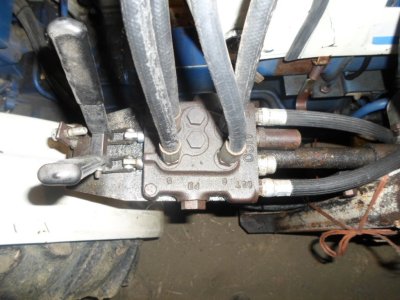
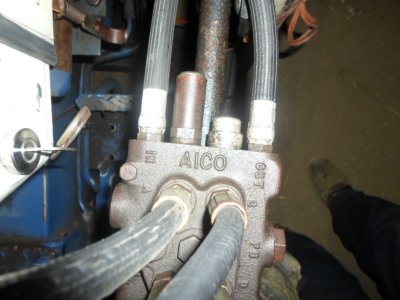
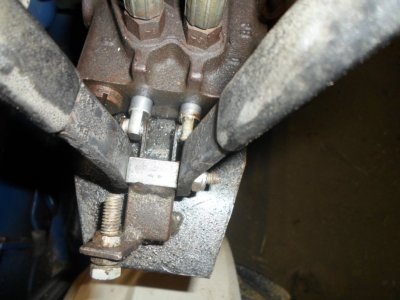
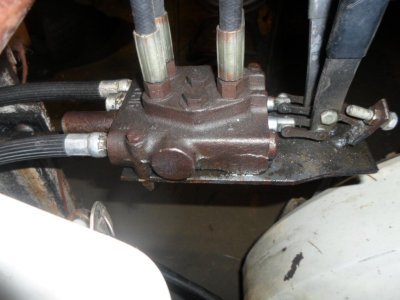
Notice no swivel end at the control valve? Sure makes thing a lot harder to replace that control valve.
Hear are some photos of mine, think it is an AL:CO branded valve.




Notice no swivel end at the control valve? Sure makes thing a lot harder to replace that control valve.
Last edited:
Another example of never fix anything just throw it away and replace it. I can still remember when a town of any size had a repair shop where you could get things like toasters, TV's, fans and tools fixed. Not anymore. Our last real old hardware store closed int Watertown a few years ago and I still miss it.Thanks Chris. From what I have found on the net your right, no "O" rings to replace. Guess when they start leaking they ae wore out..
The lumber yard carries a large selection of hardware. Had a True Value hardware store on the same block. I bought 90% of my hardware, paint, ect. there as the lumber yard makes it on the lumber materials. Hardware store started a restoration to bring it back to its near original building which was a funeral home, complete with pull rope elevator. It is now a mercantile store. Neat store but only hardware is the metric bolt & nuts they had left over.
That valve is not leaking much just yet so not going to worry about it. Will tie a big cloth under the mounting plate and use it. After buying a new battery for the Ranger S X S today can't afford it anyway. Quit holding a charge overnight. 6 years old. New one was just a tad over $200. Lasr one was over $150. Vehicle has a winch and does a lot of start/stop running so needs a bigger battery.
Wonder if someone makes a stop leak for hydro systems like the Lucas Oil automotive stop leak for power steering, engines and transmissions? It did help a differential pinion leak in the '55 and an axle seal leak in the '06 Denali. I think it is just basically a "thickener" but seems to be safe not to make oil too thick used at the correct ratios.
DAC
DAC
Several companies do including Lucas. In Rogers case it wouldn't work as there are no seals. My experience with the stuff working is yah kind of sorta. It won't compensate for bearing runout, seal grooves worn in shafts or cracked seals. If the seal or O-ring is getting stiff it will soften them up so they can do their job. Like any miracle in a bottle if the conditions are right it will work.Wonder if someone makes a stop leak for hydro systems like the Lucas Oil automotive stop leak for power steering
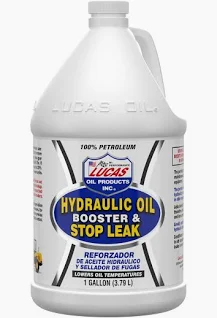
I forgot fast as I read it that this valve has no seals. Engineered obsolescence sucks.Several companies do including Lucas. In Rogers case it wouldn't work as there are no seals. My experience with the stuff working is yah kind of sorta. It won't compensate for bearing runout, seal grooves worn in shafts or cracked seals. If the seal or O-ring is getting stiff it will soften them up so they can do their job. Like any miracle in a bottle if the conditions are right it will work.
View attachment 92898
DAC
Been looking at several control valves on amazon. Most that state SAE for the port but do not specify the size of SAE. 1/4, 3/8, 1/2 "" Etc. Without checking I am 90% sure my hoses are 3/8". When I buy one I want it to be the right one and not trial and error. Going down to check in few min. so I know.
For vintage Japan made tractors we go here,Been looking at several control valves on amazon. Most that state SAE for the port but do not specify the size of SAE. 1/4, 3/8, 1/2 "" Etc. Without checking I am 90% sure my hoses are 3/8". When I buy one I want it to be the right one and not trial and error. Going down to check in few min. so I know.
Not really much more in prices, but they have stuff the others no longer carry.
Have you figured out how to save the existing hoses since there are no swivels, Rog?I have bought from them in the past. Haven't really look further until I know what size I need to fit the hoses I have.
DAC
Swivel on one end but I don't think that is at the control valve. Haven't really tried much yet as i didn't want to start a worse leak than I already have. Talking rain the rest of the week so may get it in the shop one day and work on it. Needs oil change and the "O" ring replaced at the loader hydraulics manifold. I have those ring already from Mistu.
Hopefully the runs of hose are short, Rog.Swivel on one end but I don't think that is at the control valve. Haven't really tried much yet as i didn't want to start a worse leak than I already have. Talking rain the rest of the week so may get it in the shop one day and work on it. Needs oil change and the "O" ring replaced at the loader hydraulics manifold. I have those ring already from Mistu.
DAC
